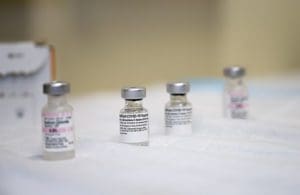
Doses of the COVID-19 vaccine at Walter Reed National Military Medical Center, Bethesda, Md. [DoD photo by Lisa Ferdinando.]
A study of essential and frontline workers infected with COVID-19 found that recent vaccination was associated with a variety of benefits. In particular, the workers who had received two or three mRNA COVID-19 vaccine doses had lower viral loads than the unvaccinated. They also had fewer fever and chill symptoms and were less likely to require medical care.
Published in JAMA, the study involved 1,199 participants from Arizona, Florida, Minnesota, Oregon, Texas and Utah. Volunteers were subjected to weekly nasal swabs regardless of symptoms from December 14, 2020, to April 19, 2022. The median age of participants was 41.
The study period encompassed both the delta and omicron waves in the U.S.
The delta variant was more likely to be symptomatic. Only 3.9% of those infected with delta were asymptomatic compared to 20.2% of omicron infections.
Among vaccinated participants infected with the delta variant, a third dose was associated with a reduced likelihood of fever or chills. For symptomatic omicron infections, a third dose was associated with a lower chance of developing fever or chills.
The study also concluded that omicron infections tended to be “milder and of a shorter duration” than delta infections.
“Our study suggests staying up to date with your vaccinations and boosters can help keep you from getting as sick,” said Abt Health Economics Principal Associate Lauren Olsho, who co-authored the study. “But especially if we do see a big winter surge, additional precautions like masking can still be another layer of protection even if you are vaccinated.”
“Our study suggests staying up to date with your vaccinations and boosters can help keep you from getting as sick,” Olsho said. “But especially if we do see a big winter surge, additional precautions like masking can still be another layer of protection even if you are vaccinated.”
Olsho notes that it is difficult to predict the pandemic’s trajectory given reduced use of masking across the U.S. “Everyone wants to get back to normal even though hundreds of people still die from COVID-19 in the U.S. every day,” Olsho said. “COVID-19 is still very much with us.”
Overall, study participants who had received two or three mRNA vaccine doses also had reduced duration of illness.
The U.S. tally of COVID-19 infections has steadily fallen since August. According to the New York Times, cases have fallen 17% in the past 14 days.
Experts fear that a range of new variants, including XBB, BQ.1.1 and BA.2.75.2, could fuel a new round of COVID-19 infections over the winter.
The FDA has authorized COVID-19 vaccines from Pfizer and Moderna.